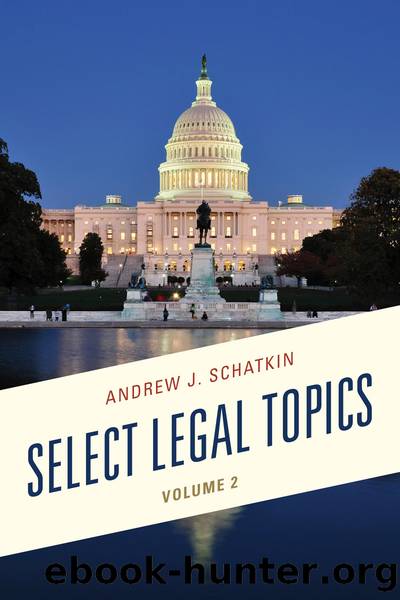Select Legal Topics by Schatkin Andrew J.;

Author:Schatkin, Andrew J.;
Language: eng
Format: epub
ISBN: 9780761866374
Publisher: UPA
Reprinted with permission from 73, QUEENS BAR BULLETIN, November 2010 at 3â4.
Chapter 13 Named or Unnamed
A Neat Question
The Civil Rights Statute 42 U.S.C. Sec. § 1983 is one of the most frequently found denizens of the Federal Court System, or rather the United States District Courts and Courts of Appeal. The Act and statute was enacted after the Civil War and during Reconstruction to control lawless and brutal Ku Klux Klan activity against recently freed slaves. Since that time, that statute has been extended to two or three significant areas. These areas include police brutality and beatings where excessive force is used in making an arrest. Further, it includes false arrest cases; and thirdly, it includes prisonerâs rights cases where beatings are inflicted and bodily harm caused to pre-trial detainees and inmates in correctional facilities, or where they are deprived by deliberate indifference of adequate and proper medical care. Often, an arrestee or inmate will not know the names or identities of the persons who have caused him great and grievous bodily harm and injury. The inmate or arrestee may file a complaint, not knowing the names of the police officers or corrections officers and refers to them as âJohn Doeâ defendants.
The question arises, therefore, and it is a neat one: is using the term âJohn Doeâ or unnamed defendant a permitted and permissible legal practice? There has been some case law resolving and interpreting this particular issue. This article proposes to review the case law and derive from it an analysis and examination of any rules concerning the use of âJohn Doeâ or the use of an unnamed defendant in civil rights actions brought under 42 U.S.C. Sec. § 1983.
One of the leading cases analyzing this issue is Wakefield v. Thompson.1 In Wakefield, plaintiff Timothy Wakefield appealed the District Courtâs dismissal of his Sec. 1983 action against âJohn Doe,â a correctional officer at the San Quentin Prison. Mr. Wakefield alleged that the âJohn Doeâ officer violated his 8th Amendment rights by refusing to provide him with prescription psychotropic medication upon his release from prison. Plaintiff Wakefield asserted that âJohn Doeâ exhibited deliberate indifference to his serious medical needs. (Wakefield suffered from an organic delusional disorder.)
According to Wakefieldâs allegations, he met with a doctor shortly before he was released from San Quentin and the doctor wrote Wakefield a prescription for two weeks worth of Navane to be filled by prison officials and dispensed upon Wakefieldâs release from prison. On the day of his release, Wakefield asked âJohn Doe,â the officer handling the release procedure, for his two-week supply of Navane and âJohn Doeâ replied that âthere wasnât any medication available.â Despite Wakefieldâs protestations concerning his need for the medicine, âDoeâ refused even to call the prison medical staff to check on Wakefieldâs prescription. When Wakefield was released from San Quentin Prison without the medicine to control his mental illness, he suffered a relapse that led to a violent outburst and his subsequent arrest.
The District Court dismissed Wakefieldâs civil rights action,
Download
This site does not store any files on its server. We only index and link to content provided by other sites. Please contact the content providers to delete copyright contents if any and email us, we'll remove relevant links or contents immediately.
Master of the Game by Sidney Sheldon(1886)
GRE Premier 2017 with 6 Practice Tests by Kaplan(1506)
Law School Essays that Made a Difference by Princeton Review(1468)
Law: A Very Short Introduction by Raymond Wacks(1387)
A Life of Crime by Harry Ognall(1382)
Objection! by Nancy Grace(1333)
Examples & Explanations: Administrative Law by William F. Funk & Richard H. Seamon(1332)
Philosophy of law a very short introduction by Raymond Wacks(1300)
Writing to Win: The Legal Writer by Steven D. Stark(1284)
College Essays that Made a Difference by Princeton Review(1270)
Cracking the SAT Premium Edition with 6 Practice Tests, 2017 by Princeton Review(1255)
Sidney Sheldon (1982) Master Of The Game by Sidney Sheldon(1192)
GMAT For Dummies by Lisa Zimmer Hatch & Scott A. Hatch(1188)
Civil Procedure (Aspen Casebooks) by Stephen C. Yeazell(1180)
Drafting Contracts: How and Why Lawyers Do What They Do, Second Edition by Stark Tina L(1175)
Storytelling for Lawyers by Meyer Philip(1140)
Graduate Admissions Essays, Fourth Edition: Write Your Way into the Graduate School of Your Choice by Donald Asher(1138)
So You Want to be a Lawyer by Lisa Fairchild Jones Esq(1102)
INDEFENSIBLE: One Lawyer's Journey Into the Inferno of American Justice by Feige David(1012)
